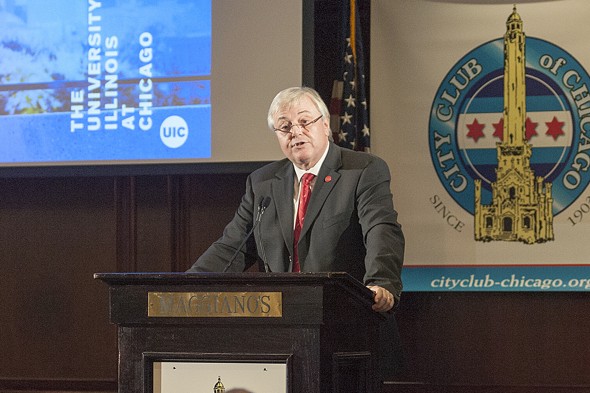Chancellor highlights campus priorities to civic leaders

“We are just scratching the surface of what we can accomplish,” Chancellor Michael Amiridis said Monday at the City Club of Chicago. Photo: Roberta Dupuis-Devlin/UIC Photo Services
Chancellor Michael Amiridis outlined four strategic priorities for UIC to an audience of local civic leaders at the City Club of Chicago Monday.
Amiridis talked about UIC’s impact at home and worldwide through research, economic development, health care and education. He highlighted UIC’s accomplishments, including Carnegie 1 research status and designation as a Hispanic-Serving Institution.
“We’ve been called — and I take it as a term of endearment because of our relative age — an adolescent institution,” Amiridis said. “And from what I know about adolescents, because I have one at home, they are strong, energetic, creative and good-looking. This is UIC today.
“But we are just scratching the surface of what we can accomplish. Our goal is to fulfill our mission to serve the city of Chicago and remain the premier urban-serving public research university in the United States.”
His first priority, Amiridis said, is student success, which requires 21st century learning technology and teaching.
“This is a new generation of learners — technology driven, with a shorter attention span and a need for instant gratification — and we need to meet them where they are if we want to connect with them,” he said. “If we wait for them to come to us, we will wait a long time.”
UIC must provide more opportunities for internships, volunteerism, research and civic engagement, the chancellor said.
“Student learning experiences have to extend beyond the classroom. This is how students acquire the skills they need to get a job.”
His second strategic priority is service to the Chicago area through partnerships with city agencies, the business community and educational and cultural institutions, Amiridis said.
“We have been, and will always be, the university for Chicago,” he said.
To increase UIC’s national and international reputation for research, his third priority, the campus should build on its strengths in four areas, Amiridis said. These include the human brain, functional and regenerative materials, solutions for community disparities in health, education and violence prevention, and urban infrastructure and the environment.
His fourth priority, the chancellor said, is a new, more efficient business model for UIC that protects the campus from the uncertainties of state funding.
“Of utmost importance is keeping tuition levels stable so that we never price-out the students we are here to serve,” he said.
“Public higher education is at a crossroads and how we pivot and fulfill our public purpose at UIC, moving forward, will have a significant impact on our students, the city and the state.”
